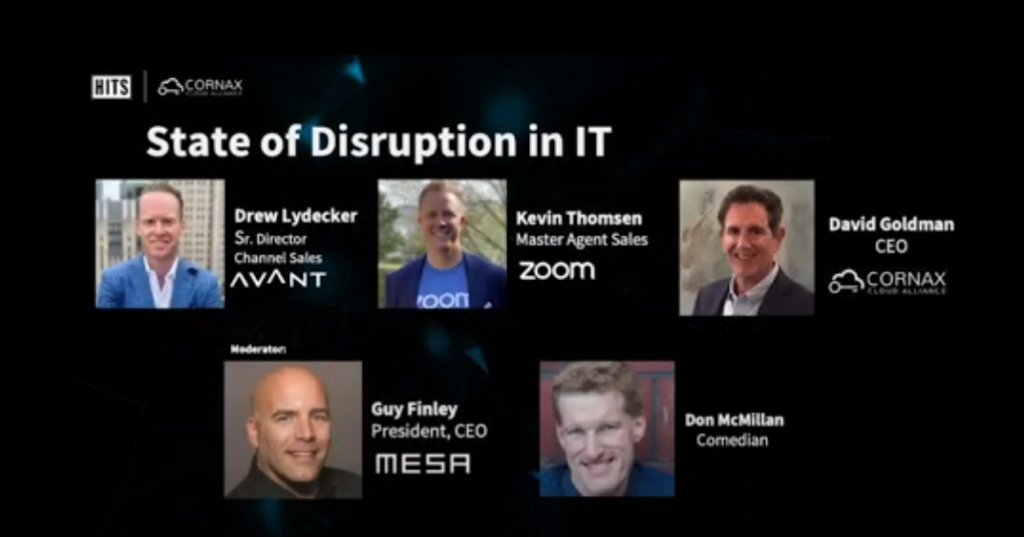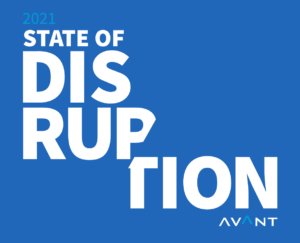
Industry Execs Tackle the State of Disruption
Amid constant change, the IT sector continues to face significant disruption from new technologies that include artificial intelligence (AI) and machine learning (ML), as well as the growing importance of the cloud, the shift to remote work, and security challenges. And trusted advisors can play a key role in helping organizations thrive, according to executives at IT services firm AVANT Communications, Cornax Cloud Alliance and Zoom.
“The only constant is change and the rate of change” keeps getting faster, Drew Lydecker, co-founder and president of AVANT, said March 16 during the virtual panel discussion “State of Disruption in IT,” the second virtual event headlined by HITS Advisory Services.
 One clear example of all that change has been the huge growth for Zoom. People in 94% of countries are now using Zoom, according to Kevin Thomsen, leader of master agents-channel sales at Zoom. That’s 226 of the 241 countries that are Zoom users, he said, adding over 125,000 schools are now using Zoom.
One clear example of all that change has been the huge growth for Zoom. People in 94% of countries are now using Zoom, according to Kevin Thomsen, leader of master agents-channel sales at Zoom. That’s 226 of the 241 countries that are Zoom users, he said, adding over 125,000 schools are now using Zoom.
The company’s service now has about 300 million daily active users and saw 326% revenue growth in its fourth quarter while maintaining profitability, he noted.
Media and entertainment organizations are the “ultimate Zoom users,” Thomsen said, pointing out many recent online M&E events, including The GRAMMYs, used Zoom. The service is embedding the cloud in everyday life now and is becoming more of a platform than just a communications tool, he said.
State of Disruption Report 2021
Lydecker highlighted some of the key findings of his firm’s “State of Disruption Report 2021,” noting it focused on a few key areas that keep changing: telecommunications and connectivity, co-location, cloud and cloud security.
For the report, about 500 U.S. enterprise decision-makers in the sector were polled about their plans for the next 12 months, he noted.
Unified Communications as a Service (UCaaS) spiked during the pandemic, with customer interest in it surging 86% at the outset of the crisis, he said, citing one of the report’s key findings. About 51% of the companies polled have dealt with bandwidth issues at certain sites when moving to UCaaS, according to the report.
AVANT, Cornax and other trusted advisors “know what you currently have and what a future solution like Zoom would look like inside your organization,” Lydecker said. “They become [an] extension of the IT staff that folks don’t necessarily have the budget to go out and find because it’s expensive to get subject matter experts on your team researching new technology every single day,” he explained.
“Very, very few companies in the world have that. But that is why the trusted advisor segment is a movement right now,” he said.
Trusted advisors have huge resources, tools and talent. They “understand what your firm looks like and where you need to go because it’s not a matter of if – it’s just a matter of when you’re going to use any of these tools or any of these technologies,” he explained.
 “This is early days” for the unified communications/voice sector and his company and trusted navigators in general are here to help companies “navigate” all the changes, he said.
“This is early days” for the unified communications/voice sector and his company and trusted navigators in general are here to help companies “navigate” all the changes, he said.
Cornax is a “trusted advisor” that helps organizations that don’t have the time to handle tech challenges themselves and doesn’t charge them for its assistance, according to David Goldman, its CEO. “We get paid by the vendors” and there are “several hundred of them” now, he said, noting they include “the biggest names in the business.”
Cornax is here to help organizations if they have questions, so “let us help you” if you have infrastructure, security and connectivity issues, he told viewers.
The New Fifth Avenue Office
As for AVANT itself, “we will never open another office” again, Lydecker said. The company will continue to have its headquarters in Chicago, London and Texas, but that is it, he noted.
Everybody participating in the online event has probably made remote working or hybrid working work, he noted, adding: “This is your new Fifth Avenue office” now and there are new technologies, including software-defined networking in a wide area network (SD-WAN) that companies need to know about.
“The days of applications being built that are still all living inside your data center that you own those days are gone,” he went on to say. Now, “you’ve got applications that live in someone else’s data center – somewhere else. You’ve got remote workers that are no longer just in your offices, that live in Iceland, that live in Zoom towns,” he said. The latter is a growing trend that he predicted will continue.
He also predicted that one the pandemic is over and we return to normal, SD-WAN and Secure Access Service Edge (SASE) will see huge growth in compound annual growth rates (CAGR).
The Security Struggle
The biggest challenge, meanwhile, is security. “We’re failing miserably” as an industry with it “for the most part,” according to Lydecker.
“It is way worse than anyone thinks it is and it’s only unfortunately going to get worse as this world continues to keep changing,” he predicted. The “traditional 10-year security playbook” is no longer applicable, he warned, adding: “If you’ve been doing the same thing for the last 10 years, you’re terminally ill and you don’t even know it.”
Companies need an “unbelievably robust team” to handle security and need to embrace different styles of security, he said.
Therefore, the managed security service provider (MSSP) market is “going to explode,” he predicted, adding: “The trusted advisor is fueling [a] new way of thinking to identify new opportunities to make sure that someone’s got your back.”
“We’re in the ninth inning of this nightmare that we’ve been in and there’s three more outs to go, and [AVANT] is ready for the next game,” he said, predicting 2021 will be an “epic year of transformation.”
 The Three Keys of Disruption
The Three Keys of Disruption
The online event kicked off with some humor from engineer-turned-comedian Don McMillan.
“When I think about disruption… there’s really three keys, in my opinion, to a smart future,” he said: “Number one: Disruptive technology. Number two: Artificial intelligence. And number three: Machine learning. These are the three hottest buzzwords about smart future.”
However, “I am going to take a disruptive view of disruption,” he said, joking disruptive technology is “any device that screws up your whole day.” And to him, the most disruptive device is the smartphone. The number one use of the device is texting, followed by posting to social media, taking pictures, watching videos and then making calls, he said, referring to the findings of a recent study.
“The phone is now the fifth use of a phone. It’s not a phone anymore,” he said, adding the number six use of a smartphone is blocking SPAM calls. “That is disruptive technology right there,” he noted.
Read about the first event here.
To download the “State of Disruption Report 2021” report, click here.
